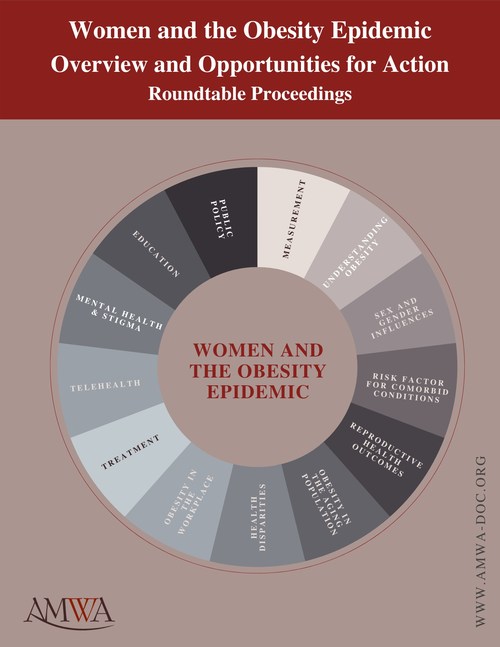AMWA Releases Proceedings of Stakeholder Roundtable on Obesity in Women
SCHAUMBURG, Ill., Dec. 6, 2022 /PRNewswire/ — Earlier this year, American Medical Women’s Association (AMWA) convened a stakeholder roundtable on the growing epidemic of obesity, focusing on its impact on women. Today, AMWA released the Roundtable Proceedings, which include essential discussion elements and recommended actions for helping to stem the obesity epidemic in women.
The U.S. prevalence of obesity in adults has more than tripled from the 1960’s when it was about 13.4 percent to the current rate of 42.4 percent. One prediction model suggests that nearly half of the adult population will have obesity by 2030. We believe the accelerating rate of obesity is cause for alarm.
“The U.S. is one of the only countries with a high rate of obesity and no official policies to address the disease. As one of the most prevalent chronic diseases, obesity affects 42.4 percent of U.S. adults and 19.7 percent of children. It impacts nearly every organ system and can lead to over 200 other chronic diseases,” said Dr. Fatima Cody Stanford, AMWA Obesity Advocacy Lead.
Discussions during the July 14th roundtable centered around the continued stigma of obesity, fueled by the common misconception that obesity is solely a lifestyle issue. Prominent medical associations, including American Medical Association and World Health Organization, have classified obesity as a disease that should be treated like all other chronic diseases.
The challenge of access to treatment was a prominent theme of discussion. Many patients who have obesity are unable to access nutritional counseling unless they qualify under a co-morbid condition, like diabetes. Despite the availability of new and effective therapies, Medicare Part D does not cover anti-obesity medications, which are still classified as vanity drugs. The Treat and Reduce Obesity Act has been introduced in each Congressional session since 2013, but, despite bi-partisan support, has not passed. This bill would recognize obesity as a treatable medical condition, expand access to comprehensive, affordable and clinically effective treatments for obesity, ensure broader coverage for intensive behavioral therapy by practitioners who are not primary care physicians, and allow for a range of FDA-approved weight loss medications.
Like many other chronic diseases, patients disproportionately impacted include those from under-resourced communities. Addressing obesity will require stakeholder engagement on multiple levels.
Participating organizations included: American College of Obstetricians and Gynecologists (ACOG), Association of Diabetes Care & Education Specialists (ADCES), American Medical Women’s Association (AMWA), Association of Black Cardiologists (ABC), HealthyWomen, National Association of Nurse Practitioners in Women’s Health (NPWH), National Black Nurses Association (NBNA), National Council on Aging (NCOA), Nurses Obesity Network (NON), Preventive Cardiovascular Nurses Association (PCNA), and WomenHeart. Some groups are already collaborating on joint educational and advocacy efforts. We hope more will join our efforts.
American Medical Women’s Association is a multispecialty organization of women physicians committed to advancing women in medicine, advocating for equity, and ensuring excellence in health care.
CONTACT: Heather Van Ness / 917-680-4440
350078@email4pr.com
SOURCE American Medical Women’s Association


